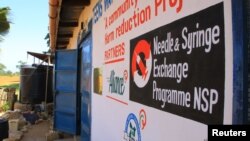NAIROBI, KENYA —
In the shadows of tourist resorts and villas along the Kenyan coast, an increasing number of heroin addicts - sharing needles and engaging in unsafe sex - are driving up rates of HIV.
By implementing a needle exchange program along the coast and in Nairobi, the Kenyan government hopes to decrease its national HIV prevalence rates. But the effort is facing resistance from community leaders at the coast.
According to Kenya’s National AIDS and STI Control Programme, or NASCOP, the numbers of injecting drug users, known as IDUs, in Kenya have hit astronomical levels. Although exact figures are difficult to determine, NASCOP released a report in March of 2012 suggesting there are now more than 26,000 IDUs on the Kenyan coast alone.
Earlier NASCOP studies have found the overall HIV prevalence rate to be about 18 percent among IDUs in Nairobi and Mombasa - a rate significantly higher than the six percent found in the general population.
Shared needles
The 2012 report also says that a third of all IDUs have shared needles.
Dr. George Githuka leads the Most-at-Risk Population of HIV programs at NASCOP. He said that through the needle exchange program, IDUs will be able to visit select treatment centers to trade in their used needles and syringes for clean ones. He said they also will be provided education and introduced to additional treatment services. “Sharing needles is a driver of the epidemic among this population. It is a most effective way to prevent and control HIV among people who inject drugs. So being evidence-based, we are able to implement knowing that it would be effective,” Githuka said.
Githuka said the exchange program has been the target of much criticism from community leaders on the coast, but said that after a series of meetings with them, they now are willing to implement a small pilot program.
Critics
Not all of them, however, are pleased with this decision.
Amina Abdalla is the provincial coordinator for FADWO, the Fight Against Drugs Women’s Organization. Firmly against the exchange program, she agreed that HIV rates may decrease, but said that drug demand will skyrocket once needles and syringes are given out freely. “On my side, with my organization, we don’t agree. Because we know our government; it’s started something and then [will] leave it. So we know that our government is not ready to help us. So, this needle will never help this country. If they want to help our country [they should] come down and help our children who are infected. But not by giving them needles. So we’re talking about, we are not going to accept this,” Abdalla said.
According to Abdalla, proper needle and syringe disposal will be another challenge of implementing such a program at the coast. “Yeah, there are a lot of our children playing around everywhere. These drug addicts, after using this injection, they just dump it anywhere," she said. "So normally our children are playing outside in the garbage area, so they take those things and they play with [them]. So it is dangerous to our country because our country is not ready for cleaning. So we have a very bad environment in fact.”
Myriad issues
Githuka admitted that proper disposal is a concern, but said the government will ensure appropriate measures are followed.
“Community members have concerns, maybe about the disposal of the needles and syringes," he said. "They’re saying there might be disposal at the community level and various other concerns. Once we are able to dispel those concerns, or if challenges arise and we are able to tackle them, we’ll learn lessons. Then we’ll be able to move on to the other facilities quickly.”
Although the program may help reduce HIV prevalence rates, many heroin addicts admit that access to free needles will likely encourage them to use more of the drug.
Joseph is a 28-year-old boat operator in Diani, a beach located south of Mombasa. He has been doing heroin for six years. According to him, addicts would prefer rehabilitation as opposed to a needle-exchange program. “A needle program, that is not a good issue even," he said. "There is no need of you to bring more needles. It’s better for us to help us. To take us to the place where we can be helped.”
The Kenyan government plans to implement the exchange program along the coast and in the capital, Nairobi, by February.
By implementing a needle exchange program along the coast and in Nairobi, the Kenyan government hopes to decrease its national HIV prevalence rates. But the effort is facing resistance from community leaders at the coast.
According to Kenya’s National AIDS and STI Control Programme, or NASCOP, the numbers of injecting drug users, known as IDUs, in Kenya have hit astronomical levels. Although exact figures are difficult to determine, NASCOP released a report in March of 2012 suggesting there are now more than 26,000 IDUs on the Kenyan coast alone.
Earlier NASCOP studies have found the overall HIV prevalence rate to be about 18 percent among IDUs in Nairobi and Mombasa - a rate significantly higher than the six percent found in the general population.
Shared needles
The 2012 report also says that a third of all IDUs have shared needles.
Dr. George Githuka leads the Most-at-Risk Population of HIV programs at NASCOP. He said that through the needle exchange program, IDUs will be able to visit select treatment centers to trade in their used needles and syringes for clean ones. He said they also will be provided education and introduced to additional treatment services. “Sharing needles is a driver of the epidemic among this population. It is a most effective way to prevent and control HIV among people who inject drugs. So being evidence-based, we are able to implement knowing that it would be effective,” Githuka said.
Githuka said the exchange program has been the target of much criticism from community leaders on the coast, but said that after a series of meetings with them, they now are willing to implement a small pilot program.
Critics
Not all of them, however, are pleased with this decision.
Amina Abdalla is the provincial coordinator for FADWO, the Fight Against Drugs Women’s Organization. Firmly against the exchange program, she agreed that HIV rates may decrease, but said that drug demand will skyrocket once needles and syringes are given out freely. “On my side, with my organization, we don’t agree. Because we know our government; it’s started something and then [will] leave it. So we know that our government is not ready to help us. So, this needle will never help this country. If they want to help our country [they should] come down and help our children who are infected. But not by giving them needles. So we’re talking about, we are not going to accept this,” Abdalla said.
According to Abdalla, proper needle and syringe disposal will be another challenge of implementing such a program at the coast. “Yeah, there are a lot of our children playing around everywhere. These drug addicts, after using this injection, they just dump it anywhere," she said. "So normally our children are playing outside in the garbage area, so they take those things and they play with [them]. So it is dangerous to our country because our country is not ready for cleaning. So we have a very bad environment in fact.”
Myriad issues
Githuka admitted that proper disposal is a concern, but said the government will ensure appropriate measures are followed.
“Community members have concerns, maybe about the disposal of the needles and syringes," he said. "They’re saying there might be disposal at the community level and various other concerns. Once we are able to dispel those concerns, or if challenges arise and we are able to tackle them, we’ll learn lessons. Then we’ll be able to move on to the other facilities quickly.”
Although the program may help reduce HIV prevalence rates, many heroin addicts admit that access to free needles will likely encourage them to use more of the drug.
Joseph is a 28-year-old boat operator in Diani, a beach located south of Mombasa. He has been doing heroin for six years. According to him, addicts would prefer rehabilitation as opposed to a needle-exchange program. “A needle program, that is not a good issue even," he said. "There is no need of you to bring more needles. It’s better for us to help us. To take us to the place where we can be helped.”
The Kenyan government plans to implement the exchange program along the coast and in the capital, Nairobi, by February.





